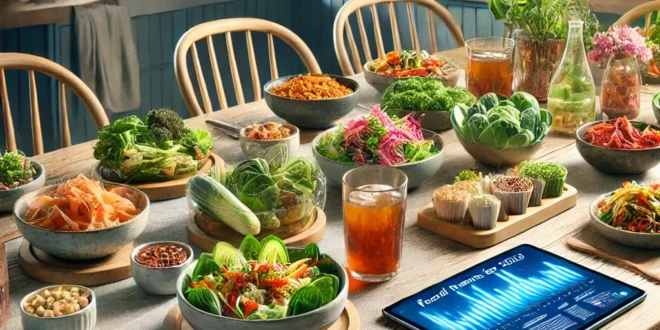As we step into 2025, the landscape of food and nutrition is undergoing a remarkable transformation, driven by innovation, sustainability, and a holistic approach to health. EatingWell’s expert team has meticulously analyzed emerging trends that are set to revolutionize how Americans think about, consume, and interact with food. This comprehensive guide explores the top trends that will shape our dietary choices, nutritional understanding, and overall wellness in the coming year.
1. Personalized Nutrition: The Age of Precision Eating
Gone are the days of one-size-fits-all dietary recommendations. In 2025, personalized nutrition has evolved from a niche concept to a mainstream approach. Advanced genetic testing, AI-powered nutrition apps, and comprehensive metabolic analysis now allow individuals to receive hyper-targeted dietary guidance. Consumers are increasingly utilizing technology that tracks their unique metabolic responses, genetic predispositions, and individual health goals to create truly personalized meal plans.
2. Sustainable Superfoods: Beyond Trendy to Essential
Sustainability is no longer just a buzzword but a critical consideration in food choices. The new generation of superfoods focuses not only on nutritional density but also on environmental impact. Alternatives like regeneratively farmed crops, algae-based proteins, and locally sourced indigenous ingredients are gaining prominence. Consumers are increasingly making choices that support both personal health and planetary wellness.
3. Mental Health and Nutritional Psychiatry
The connection between diet and mental health has never been more pronounced. Nutritional psychiatry is emerging as a groundbreaking field, with researchers and nutritionists highlighting how specific nutrients can directly impact brain chemistry, mood regulation, and cognitive function. Functional foods rich in omega-3 fatty acids, adaptogens, and micronutrients specifically targeted at supporting mental wellness are becoming mainstream.
4. Tech-Driven Culinary Experiences
Artificial Intelligence and augmented reality are transforming how we prepare, consume, and understand food. Smart kitchen appliances can now suggest recipes based on available ingredients, dietary restrictions, and nutritional goals. Meal preparation apps with advanced AI can create personalized cooking instructions, track nutritional intake, and even predict potential health outcomes based on dietary patterns.
5. Plant-Based Evolution: Beyond Meat Alternatives
Plant-based diets continue to evolve, moving far beyond simple meat substitutes. In 2025, consumers are embracing whole-food, nutrient-dense plant-based options that offer complex flavor profiles and comprehensive nutritional benefits. Fermented plant proteins, mushroom-based products, and innovative plant-derived ingredients are replacing traditional meat alternatives.
6. Microbiome-Focused Nutrition
Scientific understanding of the gut microbiome has led to a revolutionary approach to nutrition. Consumers are now prioritizing foods that support microbiome health, understanding that gut bacteria play a crucial role in overall wellness. Fermented foods, prebiotic-rich ingredients, and personalized probiotic supplements are becoming integral to dietary strategies.
7. Regenerative Agriculture and Food Transparency
Consumers are demanding complete transparency about food origins, production methods, and environmental impact. Regenerative agriculture, which focuses on rebuilding soil health and supporting biodiversity, is moving from a niche concept to a mainstream expectation. Blockchain technology is being used to provide unprecedented insight into food supply chains.
8. Functional Beverages and Adaptogenic Drinks
The beverage market is experiencing a radical transformation. Functional drinks that offer targeted health benefits are replacing traditional sodas and sugary alternatives. Adaptogenic beverages containing herbs that help manage stress, boost immunity, and support cognitive function are becoming increasingly popular among health-conscious consumers.
9. Global Flavor Fusion and Cultural Culinary Exploration
Culinary boundaries are blurring as consumers embrace global flavors and cross-cultural cooking techniques. Traditional dishes are being reimagined with modern nutritional insights, creating exciting fusion cuisines that are both delicious and nutritionally balanced. This trend reflects a growing appreciation for diverse culinary traditions and their inherent health benefits.
10. Home Cooking Renaissance
The pandemic-induced home cooking trend continues to evolve. Consumers are investing in high-quality kitchen tools, embracing online cooking classes, and viewing meal preparation as a holistic wellness activity. Cooking is no longer seen as a chore but as an essential skill for maintaining personal health and connecting with cultural roots.
Conclusion: Embracing a Holistic Approach to Nutrition
As we navigate the nutritional landscape of 2025, it’s clear that food is much more than mere sustenance. It’s a complex interplay of personal health, technological innovation, environmental sustainability, and cultural expression. By staying informed and adaptable, consumers can leverage these trends to create more meaningful, health-conscious dietary practices.
The future of food is not about restriction but about informed, personalized, and enjoyable nutrition that supports individual and planetary wellness.
 Good Calories Guide GoodCalories Guide focuses on nutrition, healthy eating, and overall wellness. The site offers practical insights into evidence-based dietary practices, including tips for specific lifestyles such as veganism, keto, and family-friendly meal planning. It also addresses unique nutritional needs for individuals with conditions like diabetes or food allergies, while providing quick and accessible recipes to make healthy living a sustainable and enjoyable choice.
Good Calories Guide GoodCalories Guide focuses on nutrition, healthy eating, and overall wellness. The site offers practical insights into evidence-based dietary practices, including tips for specific lifestyles such as veganism, keto, and family-friendly meal planning. It also addresses unique nutritional needs for individuals with conditions like diabetes or food allergies, while providing quick and accessible recipes to make healthy living a sustainable and enjoyable choice.


